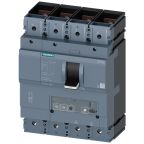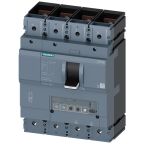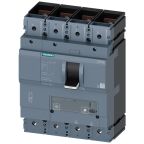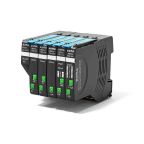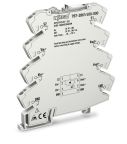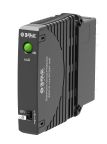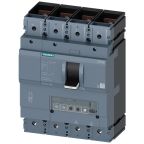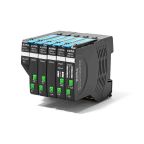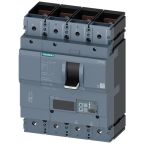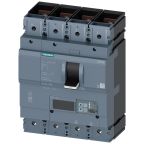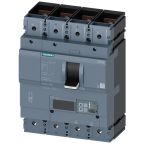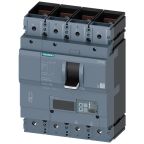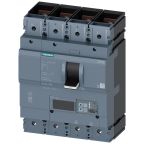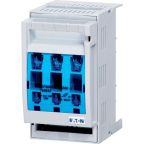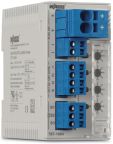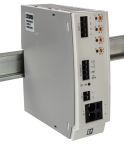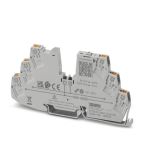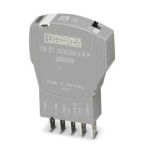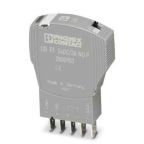Electronic Circuit Breakers
Electronic circuit breakers are automatically operated electrical switches designed to protect electrical circuits from damage caused by overcurrent or short circuits. These breakers in electronics interrupt the current flow when it exceeds a safe level, preventing damage to sensitive electronic components and ensuring the safety of the electrical system.
How Electronic Circuit Breakers Work
Electronic circuit breakers prevent overloads and short circuits. Their basic function is to keep an electrical system running safely by interrupting the flow of current when a fault is detected. They do this through a combination of active electronic current limitation (in the case of a short circuit) and an overload deactivation. This advanced electronic circuit protection capability makes them essential in various applications, from industrial automation and power distribution to protecting sensitive electronic devices in homes and businesses. They are automatically operated electrical switches and when the flow exceeds the level which has been determined as safe, they cut off the circuit to keep it safe.
Why Electronic Circuit Breakers Are Important
In homes, there's usually a main electronic circuit breaker box that protects the whole electrical system, plus smaller electronic circuit breakers built into many domestic appliances, such as washing machines, tumble dryers, and air-conditioning systems.
Without circuit breakers (or the alternative, fuses), household electricity would be impractical because of the potential for fires and other issues resulting from simple wiring problems and equipment failures. Compared to fuses, which only work once and then require replacement, electronic circuit breakers can be used repeatedly. This reusability makes them a crucial part of modern electronic circuit breaker systems, ensuring the safe and reliable operation of electrical circuits in various settings. They protect whole systems or can be applied to protecting individual appliances in the case of domestic circuit breakers.
Choose the Right Electronic Circuit Breaker
Choosing the right electronic circuit breaker involves careful consideration of several factors to ensure adequate protection for your electrical circuits:
- Voltage and Current Rating: Determine the voltage and current rating of the circuit breaker to match your electrical system's requirements. Exceeding these ratings can lead to breaker failure and potential hazards.
- Protection Features: Evaluate the protection features offered, such as overload protection, short-circuit protection, and earth fault protection, to ensure comprehensive safety. Some breakers also offer arc fault detection.
- Compatibility: Check compatibility with your existing electrical system and devices.
- Interrupting Capacity: Ensure the circuit breaker has sufficient interrupting capacity (the maximum fault current it can safely interrupt) for your application.
- Response Time: Consider the required response time and sensitivity of the circuit breaker to ensure it trips quickly enough to prevent damage in case of a fault. Faster response times are crucial for sensitive electronic components.
- Size and Mounting: Assess the circuit breaker's physical size and mounting options to ensure it fits in your electrical panel or enclosure. DIN rail mounting is a common option for industrial applications.
- Compliance: Ensure compliance with relevant industry standards and regulations for safety and reliability (e.g., IEC 60947, UL 489).
- Installation and Maintenance: Review the ease of installation and maintenance for convenient operation. Plug-in or modular designs can simplify installation.
- Environmental Factors: Account for environmental factors like temperature, humidity, and potential exposure to dust or moisture when choosing a suitable circuit breaker. Look for breakers with appropriate IP ratings.
Electronic vs. Traditional Circuit Breakers
Electronic circuit breakers offer several advantages over traditional (thermal-magnetic) circuit breakers:
- Accuracy: Electronic circuit breakers provide more accurate current sensing and tripping than traditional ones, reducing the risk of nuisance tripping or failure to trip in fault conditions.
- Speed of Response: Electronic circuit breakers use solid-state components and thus respond quicker to overcurrent situations.
- Features: Electronic breakers often have advanced features like adjustable trip settings, communication capabilities, remote monitoring, and built-in diagnostics, providing greater control and visibility into circuit performance.
- Size: Electronic breakers are generally smaller and more compact than traditional circuit breakers for similar ratings, saving valuable space in electrical panels.
- Cost: While the initial electronic breaker price might be higher, their advanced features and potential for energy savings (through monitoring and control) can lead to long-term cost benefits.
- Maintenance: Electronic breakers may require less maintenance than traditional circuit breakers, as they have no moving parts to wear out. However, they may require periodic testing to ensure proper function.
- Complexity: Electronic breakers are more complex to set up than traditional circuit breakers, requiring specialised knowledge for installation and maintenance.
- Durability: Standard circuit breakers typically have a longer lifespan and higher durability compared to electronic breakers.
Safety and Compliance in Electronic Circuit Breakers
Safety and compliance are paramount when choosing electronic circuit breakers. Look for the following:
- Compliance with Standards: Ensure the circuit breaker complies with international standards like IEC and UL, guaranteeing safety and performance.
- Overcurrent Protection: Choose a breaker with electronic circuit protection capabilities to prevent electrical fires caused by overloads. The breaker should have adjustable trip settings to match the specific load requirements.
- Short-circuit Protection: The breaker should provide reliable short-circuit protection to avoid damage to equipment and wiring.
- Ground Fault Protection (GFCI): Ensure the breaker includes ground fault protection to prevent electrical shocks and ensure personnel safety, particularly in wet or damp environments.
- Arc Fault Detection (AFCI): Consider breakers with arc fault detection to mitigate the risks of electrical arcs and fires, especially in residential and commercial buildings.
- Reset Functions: Choose between automatic and manual reset functions based on safety requirements and device needs. Manual reset is generally preferred for critical safety circuits.
- Trip Indication: Look for clear trip indication and fault diagnosis features for quick identification and resolution of electrical issues.
- Environmental Resilience: Ensure the breaker can withstand temperature and humidity variations for safe operation in harsh environments. Look for breakers with appropriate IP ratings.
Industrial Applications of Electronic Circuit Breakers
Industrial electronic circuit breakers are crucial for protecting electrical systems and equipment in various sectors:
- Renewable Energy: Safeguarding solar and wind power systems from overcurrents and faults.
- Commercial Buildings: Protecting electrical circuits in offices, retail spaces, and other commercial buildings.
- Data Centres: Ensuring the reliable operation of critical data centre infrastructure.
- Chemical Processing: Providing safe and reliable circuit protection in hazardous environments.
- Mining: Protecting electrical systems in harsh mining conditions.
- HVAC Systems: Safeguarding HVAC equipment and ensuring efficient climate control.
- Utilities: Protecting power distribution networks and ensuring reliable power supply.
- Marine: Providing reliable circuit protection in marine environments.
Trusted Electronic Circuit Breaker Manufacturer, Supplier & Distributor in Malaysia
Need reliable circuit protection for your sensitive electronics? RS is your trusted source for electronic circuit breakers in Malaysia. As a leading manufacturer, supplier, and distributor, we offer a wide selection of high-quality circuit breakers from brands like Siemens, ABB, and Eaton. Our electronic circuit breaker prices cater to diverse budgets, ensuring you can find the perfect solution for your needs. Buy your electronic circuit breakers from RS and experience quality, reliability, and expert advice.
Buy Electronic Circuit Breakers Online from RS
Ready to enhance your electrical protection with advanced technology? Buy your electronic circuit breakers online and other circuit protection devices like motor circuit protector and residual current devices like residual current circuit breakers to create a comprehensive safety system. We offer a seamless online ordering experience and fast, nationwide doorstep delivery. For detailed delivery information and fees, visit our Delivery page.
Popular Searches
Related links
- Circuit Breakers
- MCBs
- Thermal Breakers
- Schneider Electric TransferPacT Electronic Circuit Breaker 160A TA160, Fixed
- Schneider Electric TransferPacT Electronic Circuit Breaker 63A TA100, Fixed
- Phoenix Contact Electronic Circuit breaker
- Eaton Electronic Circuit breaker
- Eaton PKE Electronic Circuit Breaker 65A
